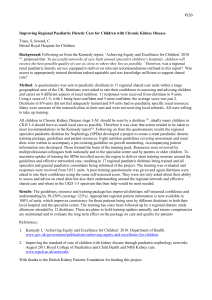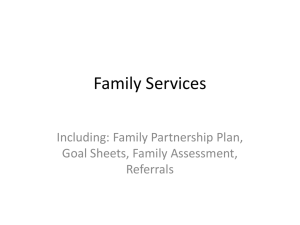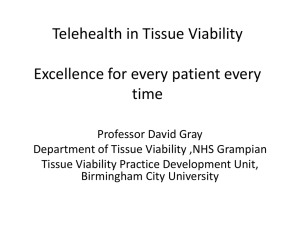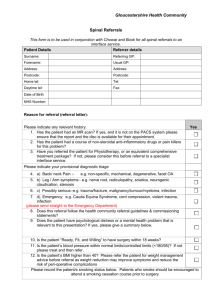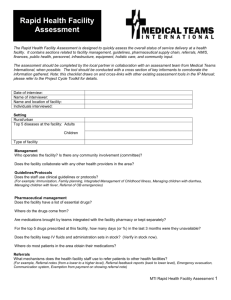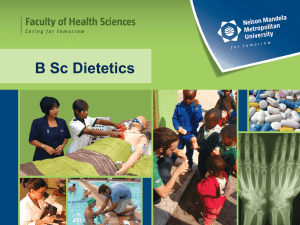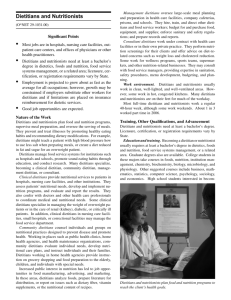Local Offer Services Template for Disabled Children dietetics
advertisement
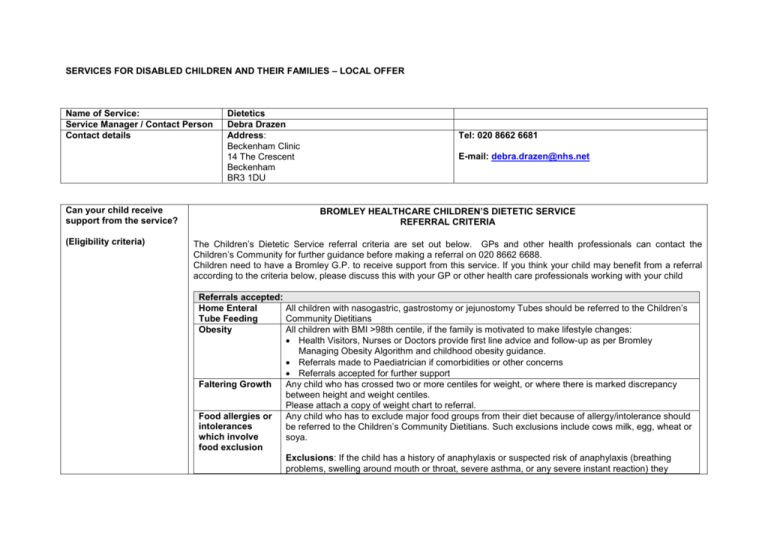
SERVICES FOR DISABLED CHILDREN AND THEIR FAMILIES – LOCAL OFFER Name of Service: Service Manager / Contact Person Contact details Can your child receive support from the service? (Eligibility criteria) Dietetics Debra Drazen Address: Beckenham Clinic 14 The Crescent Beckenham BR3 1DU Tel: 020 8662 6681 E-mail: debra.drazen@nhs.net BROMLEY HEALTHCARE CHILDREN’S DIETETIC SERVICE REFERRAL CRITERIA The Children’s Dietetic Service referral criteria are set out below. GPs and other health professionals can contact the Children’s Community for further guidance before making a referral on 020 8662 6688. Children need to have a Bromley G.P. to receive support from this service. If you think your child may benefit from a referral according to the criteria below, please discuss this with your GP or other health care professionals working with your child Referrals accepted: Home Enteral All children with nasogastric, gastrostomy or jejunostomy Tubes should be referred to the Children’s Tube Feeding Community Dietitians Obesity All children with BMI >98th centile, if the family is motivated to make lifestyle changes: Health Visitors, Nurses or Doctors provide first line advice and follow-up as per Bromley Managing Obesity Algorithm and childhood obesity guidance. Referrals made to Paediatrician if comorbidities or other concerns Referrals accepted for further support Faltering Growth Any child who has crossed two or more centiles for weight, or where there is marked discrepancy between height and weight centiles. Please attach a copy of weight chart to referral. Food allergies or Any child who has to exclude major food groups from their diet because of allergy/intolerance should intolerances be referred to the Children’s Community Dietitians. Such exclusions include cows milk, egg, wheat or which involve soya. food exclusion Exclusions: If the child has a history of anaphylaxis or suspected risk of anaphylaxis (breathing problems, swelling around mouth or throat, severe asthma, or any severe instant reaction) they Specific concerns that nutritional intake is inadequate General concerns that diet is deficient Constipation Toddler diarrhoea Faddy eating/ fussy eating/ selective eating Swallowing problems Advice on diet for behaviour and autism should be referred to the Allergy Clinic at the PRUH. Children with feeding problems due to physical feeding problems, developmental delay or medical treatments (e.g. cancer therapies). Refer to Children’s Community Dietitians for assessment, advice and follow-up. Common concerns about diets are regarding iron and calcium intakes where dietary intake is limited such as faddy eating, vegetarian/vegan diets: 1. Health Visitor/Nurse should give first line advice (available on CDS intranet). 2. Blood haemoglobin and ferritin test via GP and treatment if necessary 3. Refer to Children’s Community Dietitians if diet remains poor despite first line advice or concerns regarding faltering growth (see above). 1. First line advice sheet is given by Health Visitor/Nurse 2. G.P. to refer to Constipation Clinic at Phoenix Centre 3. Refer to Children’s Community Dietitian only if further nutritional advice or assessment needed e.g. faltering growth (see above) Referrals not accepted unless there are concerns regarding faltering growth (see below). An advice sheet is available via the CDS intranet for Health Visitor/Nurse 1. Health Visitor/Nurse provide first line advice and behavioral support Consider iron deficiency (common in toddlers and decreases appetite further). Request haemoglobin and ferritin tests via GP and treat as necessary. 2. Refer to Children’s Community Dietitians if further dietary advice or assessment needed e.g. faltering growth (see above), autism 1. Refer for speech and language assessment for advice on safe intake 2. Refer to Children’s Community Dietitians if concerns regarding adequate nutritional intake Advice on fish oils for ADHD, avoiding E-numbers for hyperactivity, special diets for autism: 1. Health professionals can provide first line written advice sheets written by the dietetics service 2. Referrals are only accepted if the child is already following an exclusion diet where assessment or advice is needed to ensure adequate nutrition, or if concerns that excessive supplements are being taken Exclusions: the service is unable to accept referrals just to discuss whether these interventions are worthwhile – this information is covered on the written advice sheets Specialist nutritional problems not seen by us (unless on Home Enteral Tube Feed) Allergy If they are under a specialist hospital allergy clinic Diabetes Managed in consultant-led clinic at PRUH Eating disorders Such as Anorexia Nervosa/ Bulimia Nervosa Refer to CAMHS Tier 3 – Oxleas for assessment Ketogenic diets for epilepsy Cystic Fibrosis TPN/ PN (parenteral nutrition) Renal/ kidney disease Liver disease Managed by hospital dietitians where diet is initiated e.g. Evelina, GOSH Managed by hospital dietitians in specialist centre Managed by hospital dietitians and team where PN is initiated. Managed by hospital dietitians in specialist centre Managed by hospital dietitians in specialist centre Children with a Bromley GP referred to the Children’s Dietetic Service (CDS) can be seen locally at Princes Plain Clinic, Community Vision Clinic or St Paul’s Cray Clinic. Home enterally fed children may be seen at home. How can your child be referred to the Service? Referrals accepted from GPs, health visitors and other health professionals, via Bromley Healthcare’s Single point of entry or by using the child health referral form How to complain about anything related to the service you receive for your child? We want you to be happy with the service you receive from us, but we know that every so often something might go wrong or could be improved. If you're unhappy with the care you receive or an element of our service, we want to hear from you. This is important to us so we can continuously improve our services Please speak to your clinician in the first instance or Head of service if you prefer, details above. If they are unable to resolve your concerns or you would like to take the matter further please contact us at the address below. Global House 10 Station Square Hayes Bromley BR2 7EH contact@bromleyhealthcare-cic.nhs.uk www.bromleyhealthcare.org.uk Please see the attached for more information on how to give your feedback to us about your experience LI0269 - Feedback Leaflet.pdf Of course, we also want to hear from you if you're happy with the care you're receiving - it's good to be able to thank the team and let people know they're doing a good job, so if you have a compliment or congratulation, we'd like to hear from you. We are also encouraging people who use our services to write a review on Patient Opinion of their experience. All postings are anonymous and feedback allows us to improve the services we provide. www.patientopinion.org.uk UNIVERSAL TARGETED SPECIALIST This means the support from the Service that is available to ALL children in mainstream preschool/schools This means the Children’s Service is available for individuals or small groups who are considered to require additional support. This means the support available to your child through a specialist package of care, such as an Education, Health and Care Plan. In Mainstream Schools: This input may involve individual support and is typically medium / longer term intervention Where necessary for the clinical management of a child, advice/training is available for teachers and other staff Learning / curriculum support This is the support from the service, available for teachers and other staff members to adapt the curriculum and environment to make sure your child makes the best possible progress in school. N/A N/A In Special schools: N/A Physical and emotional well-being Specific first line advice sheets are provided for health professionals to use, for example, information for paediatric conditions such as constipation and toddler diarrhoea Where necessary for the clinical management of a child, advice/training is available for teachers and other staff N/A This will be considered when developing a care plan with the family Access and inclusion resources N/A N/A N/A School based training N/A N/A Training is provided to schools where required for the clinical management of the child to support their nutritional and dietetic needs Support for families: N/A N/A The parents of children referred to the service who meet the referral criteria are supported to meet their child’s nutritional and dietetic needs as appropriate Therapeutic Approaches N/A N/A N/A
